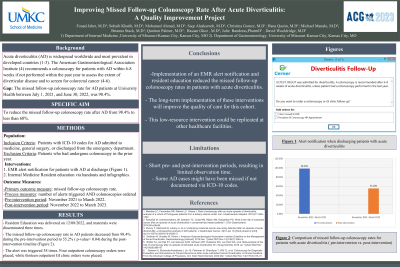Sunday Poster Session
Category: Colon
P0160 - Improving Missed Follow-Up Colonoscopy Rate After Acute Diverticulitis: A Quality Improvement Project
Sunday, October 22, 2023
3:30 PM - 7:00 PM PT
Location: Exhibit Hall

Has Audio

Fouad Jaber, MD
University of Missouri-Kansas City
Kansas City, MO
Presenting Author(s)
Fouad Jaber, MD1, Sohaib Khatib, MD1, Christina Gomez, MD1, Mohamed Ahmed, MD1, Hana Qasim, MD1, Michael Manalo, MD1, Brianna Stack, MD1, Palmer Quinton, MD1, Hassan Ghoz, MD1, Julie Banderas, PharmD2, David Wooldridge, MD2
1University of Missouri-Kansas City, Kansas City, MO; 2University of Missouri Kansas City, Kansas City, MO
Introduction: Acute diverticulitis (AD) is widespread worldwide and most prevalent in developed countries (1-3). The American Gastroenterological Association Institute (4) recommends a colonoscopy for patients with AD within 6-8 weeks of AD if not performed within the past year to assess the extent of diverticular disease and to screen for colorectal cancer (4-6). The missed follow-up colonoscopy rate for AD patients at University Health between July 1, 2021, and June 30, 2022, was 99.2%. We aimed to reduce the missed follow-up colonoscopy rate after AD from 99.2% to less than 60%.
Methods: The quality improvement interventions included the implementation of an EMR alert notification for patients with AD at discharge and Internal Medicine (IM) residents' education. The alert is triggered by the discharge order for patients with AD and requires the provider to choose between ordering a future GI clinic follow-up or outpatient colonoscopy (
Figure 1-A
). Educational efforts included presentations at resident meetings and dissemination of infographics and handouts via email. The primary outcome was missed follow-up colonoscopy rate. Patients with ICD-10 codes for AD who are admitted to medicine, general surgery, or discharged from the emergency department were included. Patients who had undergone colonoscopy in the prior year were excluded. The number of alerts triggered and colonoscopies ordered were collected as process measures. The pre-intervention period was from November 2021 to March 2022, and the post-intervention was from November 2022 to March 2023.
Results: Resident Education was delivered on 12/08/2022, and materials were disseminated three times. The missed follow-up colonoscopy rate in AD patients decreased from 98.4% during the pre-intervention period to 55.2% ( p-value= 0.04) during the post-intervention timeline (Figure 1-B). The alert was triggered 38 times. Four outpatient colonoscopy orders were placed, while thirteen outpatient GI clinic orders were placed.
Discussion: Our interventions reduced missed follow-up colonoscopy rates in AD patients. The long-term implementation of these interventions will ultimately improve the quality of care for this cohort. This low-resource intervention could be replicated at other facilities. Our project limitations include short pre- and post-intervention periods, resulting in limited observation time. Also, some AD cases might have been missed if not documented via ICD-10 codes.

Disclosures:
Fouad Jaber, MD1, Sohaib Khatib, MD1, Christina Gomez, MD1, Mohamed Ahmed, MD1, Hana Qasim, MD1, Michael Manalo, MD1, Brianna Stack, MD1, Palmer Quinton, MD1, Hassan Ghoz, MD1, Julie Banderas, PharmD2, David Wooldridge, MD2. P0160 - Improving Missed Follow-Up Colonoscopy Rate After Acute Diverticulitis: A Quality Improvement Project, ACG 2023 Annual Scientific Meeting Abstracts. Vancouver, BC, Canada: American College of Gastroenterology.
1University of Missouri-Kansas City, Kansas City, MO; 2University of Missouri Kansas City, Kansas City, MO
Introduction: Acute diverticulitis (AD) is widespread worldwide and most prevalent in developed countries (1-3). The American Gastroenterological Association Institute (4) recommends a colonoscopy for patients with AD within 6-8 weeks of AD if not performed within the past year to assess the extent of diverticular disease and to screen for colorectal cancer (4-6). The missed follow-up colonoscopy rate for AD patients at University Health between July 1, 2021, and June 30, 2022, was 99.2%. We aimed to reduce the missed follow-up colonoscopy rate after AD from 99.2% to less than 60%.
Methods: The quality improvement interventions included the implementation of an EMR alert notification for patients with AD at discharge and Internal Medicine (IM) residents' education. The alert is triggered by the discharge order for patients with AD and requires the provider to choose between ordering a future GI clinic follow-up or outpatient colonoscopy (
Figure 1-A
). Educational efforts included presentations at resident meetings and dissemination of infographics and handouts via email. The primary outcome was missed follow-up colonoscopy rate. Patients with ICD-10 codes for AD who are admitted to medicine, general surgery, or discharged from the emergency department were included. Patients who had undergone colonoscopy in the prior year were excluded. The number of alerts triggered and colonoscopies ordered were collected as process measures. The pre-intervention period was from November 2021 to March 2022, and the post-intervention was from November 2022 to March 2023.
Results: Resident Education was delivered on 12/08/2022, and materials were disseminated three times. The missed follow-up colonoscopy rate in AD patients decreased from 98.4% during the pre-intervention period to 55.2% ( p-value= 0.04) during the post-intervention timeline (Figure 1-B). The alert was triggered 38 times. Four outpatient colonoscopy orders were placed, while thirteen outpatient GI clinic orders were placed.
Discussion: Our interventions reduced missed follow-up colonoscopy rates in AD patients. The long-term implementation of these interventions will ultimately improve the quality of care for this cohort. This low-resource intervention could be replicated at other facilities. Our project limitations include short pre- and post-intervention periods, resulting in limited observation time. Also, some AD cases might have been missed if not documented via ICD-10 codes.

Figure: Figure 1-A: Alert notification when discharging patients with acute diverticulitis.
Figure 1-B: Comparison of missed follow-up colonoscopy rates for patients with acute diverticulitis ( pre-intervention vs. post-intervention)
Figure 1-B: Comparison of missed follow-up colonoscopy rates for patients with acute diverticulitis ( pre-intervention vs. post-intervention)
Disclosures:
Fouad Jaber indicated no relevant financial relationships.
Sohaib Khatib indicated no relevant financial relationships.
Christina Gomez indicated no relevant financial relationships.
Mohamed Ahmed indicated no relevant financial relationships.
Hana Qasim indicated no relevant financial relationships.
Michael Manalo indicated no relevant financial relationships.
Brianna Stack indicated no relevant financial relationships.
Palmer Quinton indicated no relevant financial relationships.
Hassan Ghoz indicated no relevant financial relationships.
Julie Banderas indicated no relevant financial relationships.
David Wooldridge indicated no relevant financial relationships.
Fouad Jaber, MD1, Sohaib Khatib, MD1, Christina Gomez, MD1, Mohamed Ahmed, MD1, Hana Qasim, MD1, Michael Manalo, MD1, Brianna Stack, MD1, Palmer Quinton, MD1, Hassan Ghoz, MD1, Julie Banderas, PharmD2, David Wooldridge, MD2. P0160 - Improving Missed Follow-Up Colonoscopy Rate After Acute Diverticulitis: A Quality Improvement Project, ACG 2023 Annual Scientific Meeting Abstracts. Vancouver, BC, Canada: American College of Gastroenterology.
